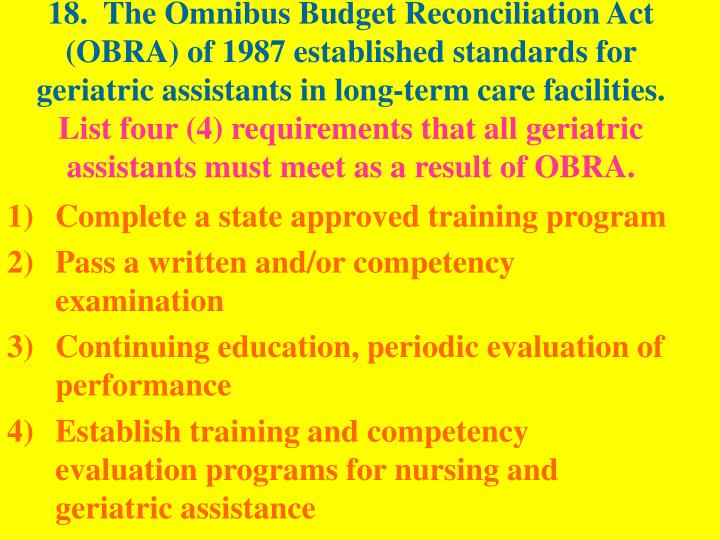

While the general purpose of the block grant concept is to consolidate and “defederalize” prior categorical aid to state and local governments, and to lighten federal regulatory burdens, there is no suggestion in the legislative history of the two specific block grants at issue here that Congress intended to exempt programs or activities funded by them from the obligation not to discriminate embodied in the four cross-cutting statutes.
#Omnibus budget reconciliation act full#
Therefore, in the absence of a clear expression of congressional intent to exempt a particular program from the obligations imposed by the four cross-cutting laws, those laws will be presumed to apply in full force. The language and legislative history of the four nondiscrimination laws at issue reveal that they were intended by Congress to be statements of national policy broadly applicable to all programs or activities receiving federal financial assistance. Part XIII of the law is also called the Revenue Reconciliation Act of 1993.Two block grant programs created by the Omnibus Reconciliation Act of 1981 are subject to four “cross-cutting” statutes barring discrimination on grounds of race, sex, handicap, and age, and activities funded under those programs are subject to all of the regulatory and paperwork requirements imposed by those statutes. It has also been unofficially referred to as the Deficit Reduction Act of 1993. The Omnibus Budget Reconciliation Act of 1993 (or OBRA-93) was a federal law that was enacted by the 103rd United States Congress and signed into law by President Bill Clinton on August 10, 1993.Deficit Reduction Act of 1993, Revenue Reconciliation Act of 1993 (en).Omnibus Budget Reconciliation Act (en).An Act to provide for reconciliation pursuant to section 7 of the concurrent resolution on the budget for fiscal year 1994.dbr:United_States_Congress_Conference_committee Re: Comprehensive Omnibus Budget Reconciliation Act of 1986 (COBRA) & Billing Question Presented: May an insurer or insurance agent require that an employer.dbr:Social_programs_in_the_United_States.dbr:List_of_tie-breaking_votes_cast_by_the_vice_president_of_the_United_States.dbc:United_States_federal_reconciliation_legislation.

dbc:United_States_federal_taxation_legislation.dbr:Vice_President_of_the_United_States.dbr:United_States_House_of_Representatives.dbr:United_States_House_Committee_on_the_Budget Text: S.1281 118th Congress (2023-2024) All Information (Except Text) As of text has not been received for S.1281 - A bill to amend the Omnibus Budget Reconciliation Act of 1993 to provide for security of tenure for use of mining claims for ancillary activities, and for other purposes.The effects of the bill helped the US federal government to experience in 1998 its first budget surplus since the 1960s era. The bill also included $255 billion in spending cuts over a five-year period. Full Title: Implementation of Section 6002(b) of Omnibus Budget Reconciliation Act of 1993 Document Type: Report Bureau(s): Wireless Telecommunications. All employees, with certain exceptions, hired after March 31 1986, are covered for Medicare under section 210 (p) of the Act (Medicare Qualified Government Employment). Consolidated Omnibus Budget Reconciliation Act of 1985 (COBRA) - COBRA is a Federal law that provides rights to temporary continuation of group health plan coverage for certain employees, retirees and family members at group rates when coverage is lost due to certain qualifying events. The act increased the top federal income tax rate from 31% to 39.6%, increased the corporate income tax rate, raised fuel taxes, and raised various other taxes. The Consolidated Omnibus Budget Reconciliation Act of 1985 (COBRA) imposed mandatory Medicare-only coverage on State and Local employees. Though every congressional Republican voted against the bill, it passed by narrow margins in both the House of Representatives and the Senate. 99-272 provided for reconciliation pursuant to section. 'An Employer's Guide to Group Health Continuation Coverage Under COBRA. 'FAQs on COBRA Continuation Health Coverage for Workers,' Pages 6-10. The bill stemmed from a budget proposal made by Clinton in February 1993 he sought a mix of tax increases and spending reductions that would cut the deficit in half by 1997. Public Laws Public Law 99-272 Consolidated Omnibus Budget Reconciliation Act of 1985 Summary Pub. 'Consolidated Omnibus Budget Reconciliation Act of 1985,' Pages 100 Stat. In the Omnibus Budget Reconciliation Act of 1993 (OBRA 93), Congress created three exceptions to the general rule that an individuals assets held in trust. Part XIII of the law is also called the Revenue Reconciliation Act of 1993.


 0 kommentar(er)
0 kommentar(er)
